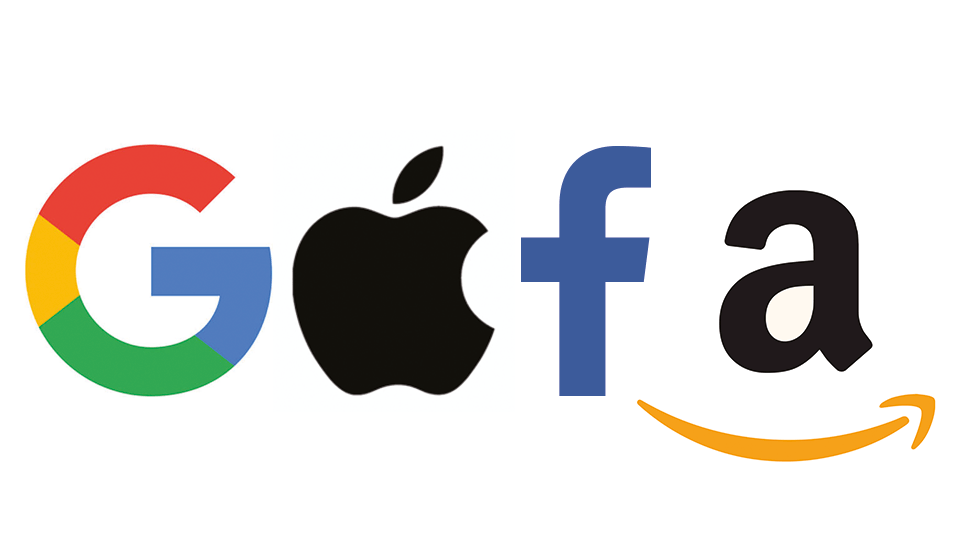Although the European model of capitalism delivers higher quality public services and is more egalitarian, it has become conventional wisdom that it is less innovative than its American counterpart. This general belief is worth challenging.
The quintessential examples of innovations produced by the American model are its tech giants, better known as GAFA (Google, Apple, Facebook, and Amazon). The question is are we as a global society better off now that we have these innovations or not?
Tech giants are enormous money-making machines. By market capitalisation, the total value of their stocks, they are respectively the fifth, first, sixth and fourth most valuable companies in the world.
This enormous wealth, is clearly not equally distributed, on the contrary, in the decades since they were born, income inequality has increased in the United States. They are also champions of tax evasion. But these two massive problems cannot be blamed on the companies themselves but rather on the incompetence and corruption of policy makers.
Google essentially replaced encyclopaedias and the yellow pages (and maps). We can find information about any subject and search for any product or service we want or need. And this, for the price of having an internet connection and owning a piece of hardware to have access to it. Basically, for free.
We now understand the free access we have to Google’s many services has a cost. And that the cost is our privacy. Google keeps track of everything we do online and sells this information to advertisers so that we can be targeted.
This poses many problems, but I do not know evidence that proves that such faults outweigh the fact to have given access to an encyclopaedia to millions of adults and children around the world. In my view, whatever the problems Google created, overall, it has added more value to society than it has destroyed.
Apple is mainly a seller of high-end hardware. Some of the gold Apple purchases might come from illegal mining exploitations and it is also rightly criticised by the high commission it takes for sales done on its purchasing platforms.
However, Apple’s innovations do not play a critical role in society. In a way, it is more comparable to a seller of luxury goods like LVMH than to a tech company. It can therefore be argued that it has also created more value than destroyed.
Facebook helps many people stay connected to loved ones from faraway. Amongst other positive features, Facebook and its other social media platform Instagram are very useful tools for small businesses to advertise their products.
On the flip side, Facebook acts as a resonance box to some of the most dangerous ideas in our society. Notably, it was key to Donald Trump’s presidential election and its negligence to curtail hate speech was determinant in the genocide of the Rohingya in Myanmar.
Additionally, research has shown the threatening impact that that social media platforms can have on teenager’s minds. Has Facebook created or destroyed more value to society? It is legitimate to think the world would be better off now had Facebook never existed.
The list of misdeeds of Amazon is so extensive that it’s not worth even discussing its positive sides. The only stakeholders Amazon benefits are its shareholders. For its employees, it offers gruelling working conditions on top of low wages, while simultaneously crushing their attempts to unionise. For society, it has contributed to the decay and destruction of midsize cities and middle class communities by driving out of business thousands of small brick and mortar shops that were essential to their social fabric.
For independent retailers selling on the platform "11 percent described their experience as broadly successful, while 18 percent said their experience had been unsuccessful. Another 71 percent described their experience as neither successful nor unsuccessful, reporting that their Amazon sales generated additional revenue but only enough to make up for the cost of selling on the platform” according to the July 2019 Independent Business Survey.
For competitors, a research paper published on the Yale Law Journal in 2017 states that Amazon “exploits information collected on companies using its services to undermine them as competitors” and that “Amazon’s business strategies and current market dominance pose anticompetitive concerns that the consumer welfare framework in antitrust fails to recognize.”
I must admit I have no respect either for its founder and richest man on earth who spends his fortune in outer space travel while more than forty percent of the world’s population lives with less than $5,50 per day.
The picture is thus mixed. Out of the four most heralded innovations wrought by the American model, we can conclude that half have created more value to society than they have destroyed, while the other half has destroyed more value than they have created. In parallel, the assumedly less innovative European model won the race to produce the first COVID 19 vaccine and outperforms its American rivals in critical technologies for our future like 5G or wind energy.
Thus, let us not be deceived by the mirage of innovation. Not every innovation adds value to society. Wealth creation is not really the challenge of our times. Wealth will continue to be created if human’s inventiveness is permitted to flourish. Wealth distribution is the task my generation and the following ones must focus on. At this, the European model has proven to be more innovative and successful.


